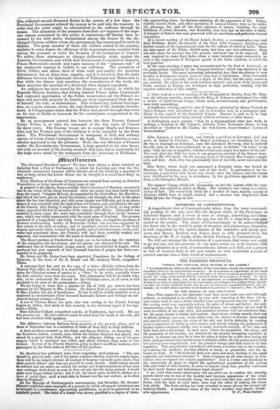THE FARMER'S PROSPECTS.
" REPEAL THE CORN-LAW, WHAT BECOMES OF THE EARNER?
"A correspondent, alive to the mischief of the Corn-laws, dreads the consequences of repealing them to the agricultural tenantry. Ho is 'a person of experience in the ways of landlords, and believes that although the price of wheat would be materially lowered, nearly the same rents would still be extorted from the occupiers of lands. To them the result would be ruin ; yet, such is the eagerness of competition for farms, there would be no lack of applicants for the succession, at perhaps even higher rents. Know- ing this, the needy landlord would only in rare instances be compelled to lower his de- mands; he would reduce another set of farmers to poverty."-8peckstor, Poe. 10, 1838.
TO THE EDITOR OF THE SPECTATOR.
Sin—This appeared in the Spectator more than seven years ago; and although refuted, or attempted to be refuted, by your able reasoning at the time, yet re- cent events tend to cast a doubt whether your correspondent was not correct. If the coming event very materially reduce the price of wheat and barley, the only remunerating crops for the thin light land farmer, the reduction by one half or even two-thirds of his rent, tithe, and parochial burdens, will not reimburse him; for his great charge is labour and manure. Such farms, letting usually from ten to fifteen shillings per acre, would either rain the fanner or become unoccupied and uncultivated; raising the value of the rich and fertile districts, by causing
lneat competition for farms on such estates, and utterly ruining the proprietors of anded estates composed chiefly, and in many instances entirely, of the thin and light land above-mentioned. In such cases, where the proprietor, the clergy, and the peasantry of the locality, are deserted by the present occupying capitalist or farmer, it matters not that for a time his place is taken by a new man trying his luck: such portions of the country must eventually suffer; for the outlay must (with low prices) prove unprofitable, and the greatest energy and skill must be in vain expended. This unprofitable expenditure will prove a serious loss to the country, by reducing the landlord, whether affluent or needy, to pauperism, and the la-
bourer to want. " the Colonial field now open and most :netting to the small capitalist and industrious labourer"? Does it appear an all -wise design of Pro- vidence thus to expand our surplus population? And is it wise and beneficial to the community at large to export the agricultural population of the various hills and welds of this country, in order to import cheap corn, possibly cultivated by their hardy frames and industrious hand abroad ? I am sorry that recent observation will not allow me to confirm the cheering reports lately sent to you of the healthy and vigorous appearance of the crops. The season continues unusually damp, the ground cold and wet; and the recent frosts, with the land in such state, have had the effect of making the wheat look sickly. The Lent sowing has been retarded in many places, the ground not working kindly. A moderate share of dry warm weather may restore favour-


























 Previous page
Previous page